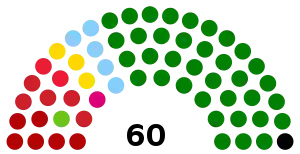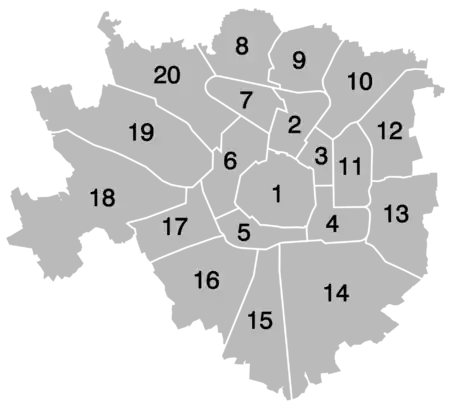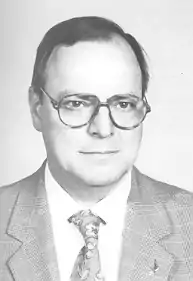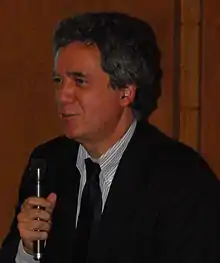1993 Milan municipal election
Municipal elections were held in Milan on 6 and 20 June 1993 to elect the Mayor of Milan and the 60 members of the City Council.
| |||||||||||||||||||||||
| Turnout | 78.1% (first round) 69.3% (second round) | ||||||||||||||||||||||
|---|---|---|---|---|---|---|---|---|---|---|---|---|---|---|---|---|---|---|---|---|---|---|---|
| |||||||||||||||||||||||
| |||||||||||||||||||||||
For the first time under the new electoral law citizens could vote directly the mayor.
Background
After gaining 11 seats in the City Council in 1990 election, for the first time the newborn separatist Lega Nord presented its own mayoral candidate: the partisan and lawyer Marco Formentini. Formentini was a former socialist, politically a left-wing, and for this reason a strong candidate in a city like Milan, historically close to leftist ideas but at the same time attracted by the new proposals of the Lega Nord party. The resentment against Rome's centralism (with the famous slogan Roma ladrona, which loosely means "Rome big thief") and the Italian government, common in northern Italy as many northerners felt that the government wasted resources collected mostly from northerners' taxes, was very strong[1] and resentment against illegal immigrants was widespread. Finally, the Tangentopoli corruption scandals, which started right in Milan and invested most of the established parties, were unveiled from 1992 on and broke the traditional link between the city and the powerful milanese Socialist Party. Then a Lega Nord candidate in Milan was not considered a conservative also because the lombard wing and, more broadly, the bulk of the original Lega Lombarda has tended to be the left-wing of the party. More of the members of the Lega Lombarda hailed from the far-left of the political spectrum, having been active in the Italian Communist Party, il manifesto movement, the Party of Proletarian Unity, Proletarian Democracy and the Greens,[2][3] and conceived Lega Nord as a centre-left (and, to some extent, social-democratic) political force.[4][5]
The main opposition to Formentini was represented by Nando Dalla Chiesa, son of the general Carlo Alberto, killed by the Mafia in 1982. Dalla Chiesa was instead the candidate of a center-left coalition composed by the ex-communist Democratic Party of the Left and some other progressives party (such as the new-born Federation of the Greens and the Communist Refoundation Party).
Voting system
The voting system is used for all mayoral elections in Italy of cities with a population higher than 15,000. Under this system voters express a direct choice for the mayor or an indirect choice voting for the party of the candidate's coalition. If no candidate receives at least 50% of votes, the top two candidates go to a second round after two weeks. This gives a result whereby the winning candidate may be able to claim majority support, although it is not guaranteed.
The election of the City Council is based on a direct choice for the candidate with a preference vote: the candidate with the majority of the preferences is elected. The number of the seats for each party is determined proportionally.
Results
Although Dalla Chiesa was seen as a man outside the old corrupted parties, Formentini managed to win the election on the second round gaining the support of the moderate and centrist voters of the agonizing Christian Democracy party.
On 20 June 1993 Formentini heavily won the election and became the first directly elected mayor of Milan, the first one from a non-socialist party since 1945.
The future secretary of the Lega Nord party, Matteo Salvini, was firstly elected municipal councillor, aged 20.
| Candidate | Party | Coalition | First round | Second round | |||
|---|---|---|---|---|---|---|---|
| Votes | % | Votes | % | ||||
| Marco Formentini | LN | 346,425 | 38.82 | 452,732 | 57.08 | ||
| Nando Dalla Chiesa | PDS | Alliance of Progressives | 270,554 | 30.39 | 340,708 | 42.92 | |
| Pietro Bassetti | DC | DC • PSDI | 97,095 | 10.88 | |||
| Adriano Teso | PS | 60,121 | 6.74 | ||||
| Gianpietro Borghini | S&R | 54,856 | 6.15 | ||||
| Riccardo De Corato | MSI | 25,899 | 2.90 | ||||
| Others | 36,782 | 4.11 | |||||
| Eligible voters | 1,195,257 | 100.00 | 1,195,257 | 100.00 | |||
| Did not vote | 261,197 | 21.85 | 367,317 | 30.73 | |||
| Voted | 934,060 | 78.15 | 827,940 | 69.27 | |||
| Blank or invalid ballots | 54,718 | 1.7 | 51,484 | 1.6 | |||
| Total valid votes | 879,342 | 98.3 | 776,456 | 98.4 | |||
Summary of the 1993 Milan City Council election results
 | ||||||
| Parties and coalitions | Votes | % | Seats | |||
|---|---|---|---|---|---|---|
| Lega Nord | LN | 307,122 | 40.9% | 36 | ||
| Communist Refoundation Party (Rifondazione Comunista) | PRC | 85,349 | 11.4% | 6 | ||
| Democratic Party of the Left (Partito Democratico della Sinistra) | PDS | 66,250 | 8.8% | 5 | ||
| The Network (La Rete) | LR | 26,884 | 3.6% | 1 | ||
| Federation of the Greens (Federazione dei Verdi) | FV | 23,150 | 3.1% | 1 | ||
| Others | 10,683 | 1.4% | 0 | |||
| Dalla Chiesa coalition (Centre-left) | 212,316 | 28.2% | 13 | |||
| Christian Democracy (Democrazia Cristiana) | DC | 70,881 | 9.4% | 5 | ||
| Italian Democratic Socialist Party (Partito Socialdemocratico Italiano) | PSDI | 2,790 | 0.4% | 0 | ||
| Others | 7,356 | 1.0% | 0 | |||
| Bassetti coalition (Centre) | 81,127 | 10.8% | 5 | |||
| Segni Pact (Patto Segni) | PS | 51,763 | 6.9% | 3 | ||
| Socialists and Reformists (Socialisti e Riformisti) | S&R | 40,229 | 5.3% | 2 | ||
| Italian Social Movement (Movimento Sociale Italiano) | MSI-DN | 25,205 | 3.3% | 1 | ||
| Others | 33,846 | 4.5% | 0 | |||
| Total | 751,608 | 100% | 60 | |||
| Votes cast / turnout | 934,060 | 78.1% | ||||
| Registered voters | 1,195,257 | |||||
| Source: Ministry of the Interior | ||||||
Results by zones

Second round
Table below shows the results of the votes for mayoral candidates on the second round in each zona:[6]
|
|
Notes
- Rumiz, Paolo (2001). La secessione leggera. Dove nasce la rabbia del profondo Nord. Milan: Feltrinelli. pp. 10–13.
- Signore, Adalberto; Trocino, Alessandro (2008). Razza padana. Milan: BUR. pp. 22–23, 57.
- De Lucia, Michele (2011). Dossier Bossi-Lega Nord. Milan: Kaos. p. 1.
- Fregonara, Gianna (8 May 1995). "Bossi riaccoglie Maroni e torna alle origini". Milan: Corriere della Sera.
- Ballardin, Gianfranco (28 January 1995). "Maroni: solo, ma vado al congresso". Milan: Corriere della Sera.
- Municipality of Milan – Electoral archive

